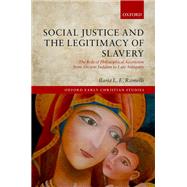Social Justice and the Legitimacy of Slavery The Role of Philosophical Asceticism from Ancient Judaism to Late Antiquity
, by Ramelli, Ilaria L.E.- ISBN: 9780198777274 | 0198777272
- Cover: Hardcover
- Copyright: 1/24/2017
Were slavery and social injustice leading to dire poverty in antiquity and late antiquity only regarded as normal, "natural" (Aristotle), or at best something morally "indifferent" (the Stoics), or, in the Christian milieu, a sad but inevitable consequence of the Fall, or even an expression of God's unquestionable will? Social Justice and the Legitimacy of Slavery shows that there were also definitive condemnations of slavery and social injustice as iniquitous and even impious, and that these came especially from ascetics, both in Judaism and in Christianity, and occasionally also in Greco-Roman ("pagan") philosophy. Ilaria L. E. Ramelli argues that this depends on a link not only between asceticism and renunciation, but also between asceticism and justice, at least in ancient and late antique philosophical asceticism.
Ramelli provides a careful investigation through all of Ancient Philosophy (not only Aristotle and the Stoics, but also the Sophists, Socrates, Plato, the Neoplatonists, and much more), Ancient to Rabbinic Judaism, Hellenistic Jewish ascetic groups such as the Essenes and the Therapeutae, all of the New Testament, with special focus on Paul and Jesus, and Greek, Latin, and Syriac Patristic, from Clement and Origen to the Cappadocians, from John Chrysostom to Theodoret to Byzantine monastics, from Ambrose to Augustine, from Bardaisan to Aphrahat, without neglecting the Christianized Sentences of Sextus. In particular, Ramelli considers Gregory of Nyssa and the interrelation between theory and practice in all of these ancient and patristic philosophers, as well as to the parallels that emerge in their arguments against slavery and against social injustice.
Ramelli provides a careful investigation through all of Ancient Philosophy (not only Aristotle and the Stoics, but also the Sophists, Socrates, Plato, the Neoplatonists, and much more), Ancient to Rabbinic Judaism, Hellenistic Jewish ascetic groups such as the Essenes and the Therapeutae, all of the New Testament, with special focus on Paul and Jesus, and Greek, Latin, and Syriac Patristic, from Clement and Origen to the Cappadocians, from John Chrysostom to Theodoret to Byzantine monastics, from Ambrose to Augustine, from Bardaisan to Aphrahat, without neglecting the Christianized Sentences of Sextus. In particular, Ramelli considers Gregory of Nyssa and the interrelation between theory and practice in all of these ancient and patristic philosophers, as well as to the parallels that emerge in their arguments against slavery and against social injustice.






